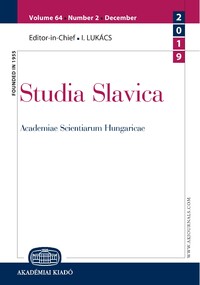О содержательном варьировании термина космизм
On the Semantic Variation of the Term Cosmism
Author(s): Natalia Vitalievna KozlovskayaSubject(s): Semantics
Published by: Akadémiai Kiadó
Keywords: cosmism; cognitive approach to terminology; discourse; frame analysis; slot; variously interpreted terms; interpretational variants; significant commonality
Summary/Abstract: The research is aimed at the revelation and linguistic substantiation of the differences in the conceptual contents the term cosmism demonstrates in different branches of knowledge. In order to solve the above-mentioned scientific task, the contextual definitions of the term are analyzed and the similarities and differences in the functioning and meaning of the term are revealed depending on different discourse types such as the religious-philosophical, philosophical, natural-science as well as literary and art discourse. The comparison of the conceptual meanings of the term cosmism in languages for special purposes has shown that cosmism as a philosophical term can comprise historical and subjective semantic components which reflect the development of philosophical thought within the framework of a certain movement or of an individual world view (cosmism in Ancient Greek philosophy, Spinoza’s cosmism, the late cosmism, Berdyaev’s cosmism). The transformation of the term’s semantic structure in philosophical discourse does not affect the conceptual meaning including the basic slots which remain preserved in all systems of terminology without exception. However, the slot structure and the semantic connection between them may be different: in most conceptions, the universal, or cosmic, principle prevails over the individual one, while in Berdyaev’s individual terminology, a term selection can be observed and the slot ‘subordination’ is replaced through the slot ‘equality’. This statement is the evidence of the fact that cosmism is a variously interpreted philosophical term whose definitive variation is determined by a certain philosop hical term system, including the one of an individual author. The term can be interpreted in a broad sense (the philosophical understanding of cosmism) and a narrow sense (the natural-science understanding of cosmism in Tsiolkovsky’s and Vernadsky’s works). Beyond the philosophical discourse, the term is frequently used as a concept in the study of literature, where it denotes different types of poetic worldview (Tyutchev’s cosmism, Esenin’s cosmism). Besides, the term cosmism belongs to the closed term system as a denomination for the Proletarian poetry movement in the years 1918–1925 (the works of Proletkult poets). The above-mentioned interpretational variants are united by a common significant semantic component which includes the basic semes: the Human, the Universe, and the way of intercommunication between them. From an extralinguistic point of view, the semantic variation of the term is determined by a current of scientific thought and a trend for spiritual development, while linguistically it is caused by the rearrangement and addition of slots into the term’s frame structure. The research is based on texts which contain the term cosmism. Sources containing the lexicographic representation of the term (like dictionaries or encyclopedias) have not been used for the purpose of analysis since there is no source of such kind that would be able to fully reflect the semantic variation of the term.
Journal: Studia Slavica Academiae Scientiarum Hungaricae
- Issue Year: 65/2020
- Issue No: 1
- Page Range: 71-80
- Page Count: 10
- Language: Russian
- Content File-PDF

